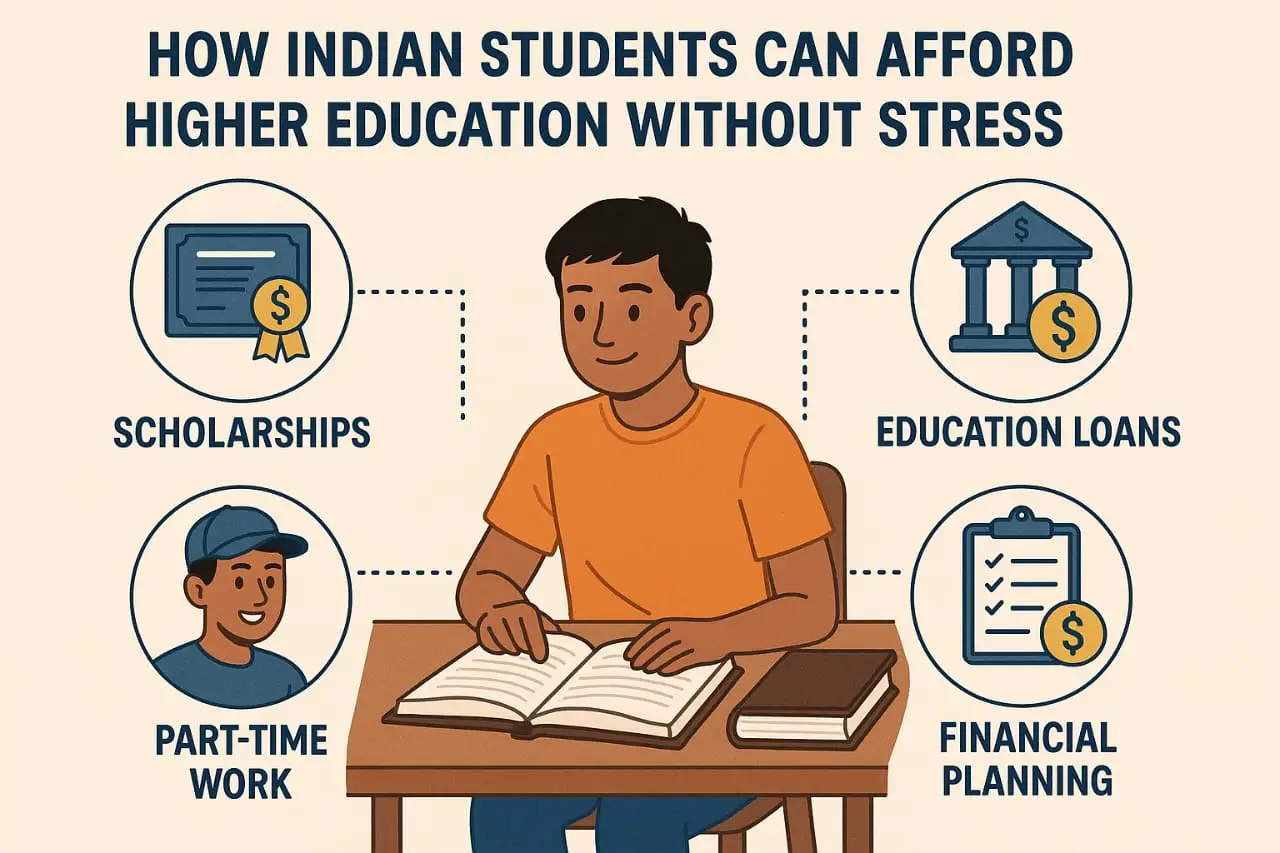How Indian Students Can Afford Higher Education Without Stress
Education is one of the most powerful tools that can shape our future. But let’s be honest – higher education is expensive, especially when you dream of top colleges or studying abroad.
Many Indian students and their families feel the pressure of rising tuition fees, hostel charges, books, and other living costs.
So, the big question is: Can Indian students afford higher education without stress?
Yes, they can! With the right planning, information, and smart choices, students can reduce financial pressure and focus more on learning. In this post, we’ll explore simple and practical ways Indian students can manage the cost of higher education — along with the pros and cons of each option.
Is Social Media Helpful or Harmful for Students
🏫 1. Choose the Right College and Course
Why it matters:
Every course and college come with a different fee structure. Some private institutions charge lakhs per year, while government colleges are much more affordable.
What to do:
-
Research colleges offering the same course at lower fees.
-
Prefer government or state universities where possible.
-
Check accreditation and placement history before deciding.
✅ Pros:
-
Saves lakhs in tuition.
-
Often offers better value for money.
❌ Cons:
-
Admission can be competitive.
-
Fewer facilities in some government colleges.
💸 2. Apply for Scholarships and Grants
Scholarships are free money for education. Many Indian and international organizations provide scholarships to talented or needy students.
Sources of scholarships:
-
Central and State Governments (e.g., NSP – National Scholarship Portal)
-
Private foundations (TATA, Aditya Birla, HDFC, etc.)
-
College-specific scholarships
-
International scholarships (for studying abroad)
✅ Pros:
-
No repayment required.
-
Boosts self-confidence and CV.
❌ Cons:
-
Requires paperwork and effort.
-
Highly competitive – need good marks or talent.
👉 Pro Tip:
Visit https://scholarships.gov.in regularly to stay updated.
🏦 3. Take an Education Loan – A Helpful Tool
Many banks and NBFCs offer student loans for higher education in India and abroad. It covers tuition, books, travel, and even living expenses.
Where to apply:
-
Public banks (e.g., SBI, Bank of Baroda)
-
Private banks (e.g., HDFC, ICICI)
-
NBFCs like Avanse, Credila
✅ Pros:
-
Easy access to large funds.
-
Repayment starts after completing the course.
❌ Cons:
-
Interest adds to cost.
-
Repayment burden after graduation.
👉 Tip:
Choose a bank with lower interest rates and go for subsidized loans if your family income is low.
Top 20 Free Online Courses App in India
👨👩👧👦 4. Family Support and Savings
Many Indian families start saving early for their child’s education. Small monthly savings over years can become a big help.
Good saving options:
-
Recurring deposits
-
PPF (Public Provident Fund)
-
Sukanya Samriddhi Yojana (for girl child)
-
Mutual funds for long-term returns
✅ Pros:
-
No loan or repayment pressure.
-
Peace of mind for the student.
❌ Cons:
-
Needs early financial planning.
-
May strain family budget in emergencies.
💼 5. Part-Time Jobs and Internships
Many students earn while they study. Whether it’s teaching tuition, freelance writing, coding, or internships — these small incomes help a lot.
Options:
-
Online platforms (Fiverr, Upwork, Chegg)
-
Campus-based part-time jobs
-
Internships with stipends
✅ Pros:
-
Learn money management.
-
Gain real-world experience.
❌ Cons:
-
Time-consuming.
-
Can affect studies if not balanced.
Best Books for Young Children in India 2025
🌐 6. Study Abroad with Affordable Programs
Many students think foreign education is only for the rich. But some countries offer low-cost or free education, especially in Europe.
Countries with low-cost education:
-
Germany (free education in public universities)
-
Norway
-
France (low tuition + scholarships)
-
Italy (scholarships for Indian students)
✅ Pros:
-
World-class education.
-
Scholarships and part-time work options.
❌ Cons:
-
Language and cultural challenges.
-
High initial costs (visa, travel, etc.)
📚 7. Use Free and Low-Cost Learning Platforms
Higher education doesn’t always mean a degree from a top college. Today, you can learn skills online at a fraction of the cost.
Great platforms:
-
Swayam (Government of India)
-
Coursera and edX (Free courses from top universities)
-
Udemy, Khan Academy
✅ Pros:
-
Learn anytime, anywhere.
-
Many courses are free or under ₹500.
❌ Cons:
-
No campus experience.
-
May not replace a full-time degree.
📝 8. Plan a Budget and Track Spending
One of the simplest but most ignored steps is to create a budget for your education journey. Know your monthly expenses, cut down on unnecessary spending, and save where possible.
How to do it:
-
Use mobile apps like Walnut, Money Manager, or Excel sheets.
-
Set a spending limit for food, travel, and entertainment.
✅ Pros:
-
Helps avoid running out of money mid-month.
-
Builds financial discipline.
❌ Cons:
-
Needs effort and consistency.
📢 Real Stories: How Students Are Managing Costs
🧑🎓 Riya from Delhi: Got a 100% scholarship from her college for scoring 95% in 12th and now studies B.Tech without spending a rupee on tuition.
👨🎓 Amit from Bihar: Took an SBI education loan for MBBS. He started giving online tuitions in the evening to manage his hostel expenses.
👩🎓 Neha from Mumbai: Studied MBA in Germany where tuition was free. She learned German in India and won a scholarship that also covered her living costs.
🔍 Final Thoughts: What You Should Do Regarding How Indian Students Can Afford Higher Education Without Stress
Higher education should not be a burden, and it doesn’t have to be — if you plan smartly.
Here’s a quick action plan:
-
Explore all scholarship options – apply early.
-
Choose your college and course wisely.
-
Use savings and low-interest loans smartly.
-
Take part-time work or internships.
-
Track every rupee – budget is your best friend.
-
Look beyond India – consider free or affordable options abroad.
Education is an investment. But you should never feel alone or helpless because of money. Many students like you are already studying smart, saving smart, and living smart. You can do it too!
💬 Share Your Experience
Have you found a smart way to manage your education expenses? Tell us in the comments on KnowledgeHubForAll – your story could help someone else!
[wpforms id=”1648″]






